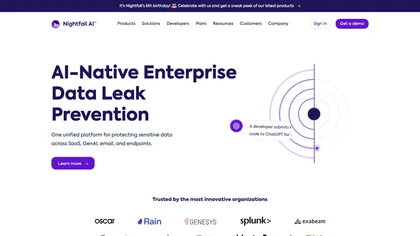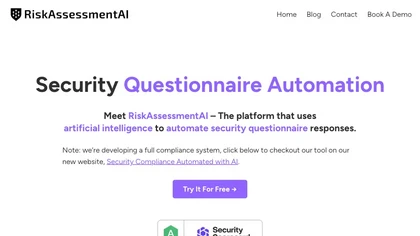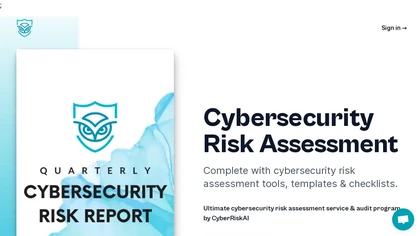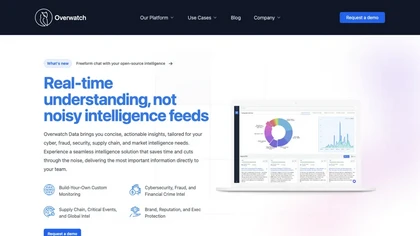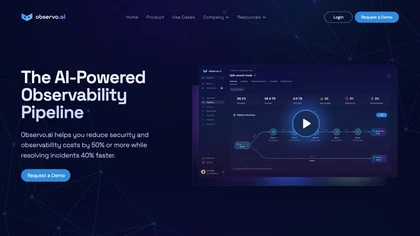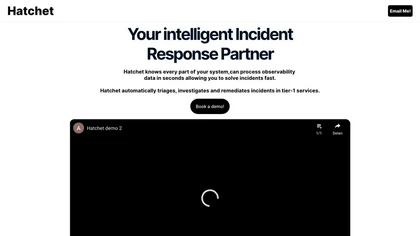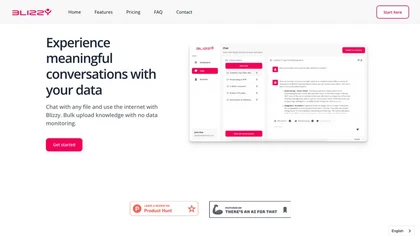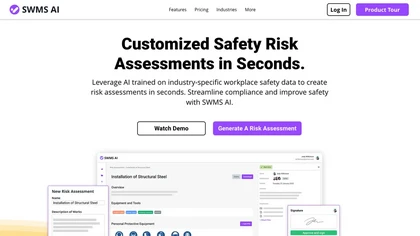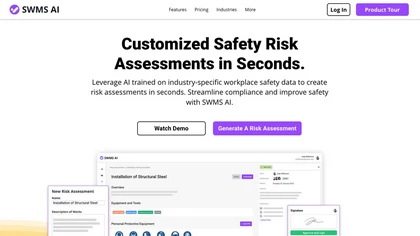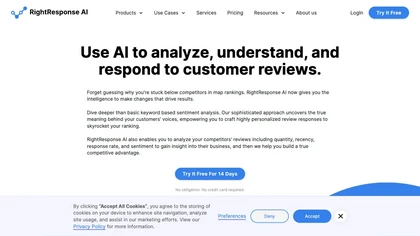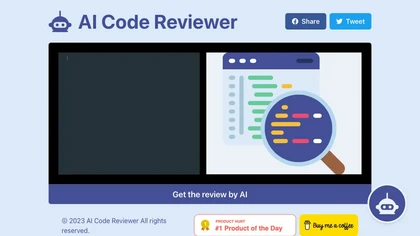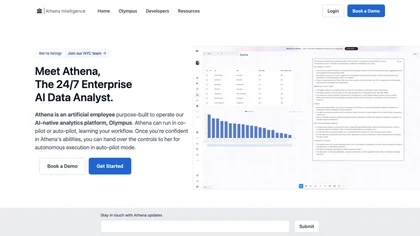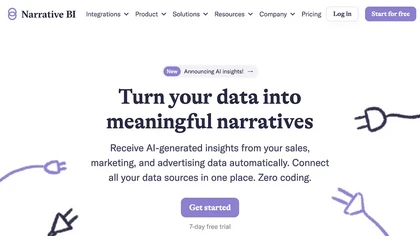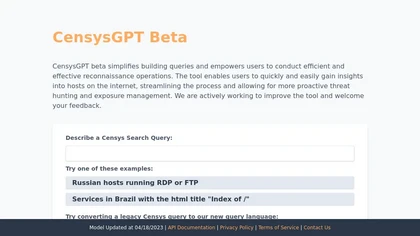AI use cases for Information Security
Generative AI can be applied in various applications for information security. Here are some examples to explore below for inspiration with AI tools to get you started with using AI in information security.
🛠️ 70 AI tools for Information Security
Explore a dynamic list of some of the most popular tools to get you started with various AI use cases and applications for Information Security to streamline your workflows and productivity today.
Inc. features
- Real-time global threat assessment
- Continuous monitoring and analysis of vast data sources
- Actionable intelligence delivery
- Comprehensive insights into evolving threats
- Integration of advanced data analytics, machine learning, and predictive modeling
CYBER AI features
- Upload security reports
- Understand security reports
- Unlock data breach reports
- Guide through step-by-step threat hunting process
- Uncover potential cybersecurity threats
Nightfall AI features
- AI-native data leak prevention platform
- Cutting-edge generative AI detection engine
- Sensitive data protection, encryption, and data exfiltration prevention
- Streamlines compliance management
- Flexible platform for custom applications
RiskAssessmentAI features
- Automate security questionnaire responses
- Scan documentation
- Build knowledge base
- Support various assessment formats
- Collaboration between teams
Cyberriskai features
- Cybersecurity risk assessment
- Automated quarterly risk audits
- Nist cybersecurity audit framework
- Comprehensive assessment report
- Employee cybersecurity practices
Mitigated.io features
- Transforms penetration test risk assessment reports into actionable workflows
- Leverages collaborative workspaces for task assignment and progress tracking
- Provides AI-enriched mitigation guidance for security vulnerabilities
- Supports easy import of assessment reports
- Enables users to enlist security mitigation services directly from the dashboard
Pentest Copilot features
- Automated Pentesting
- Fine tuned AI for security tasks
- AI & human collaboration
- Seamless json integration
- Constrained programming
🔥
Create your account, save tools & get personal recommendations
Receive a weekly digest of our handpicked top tools.
Unsubscribe anytime
ShieldForce features
- Advanced email security system
- Automated disaster recovery capabilities
- Cybersecurity awareness training
- AI-based antimalware, antivirus, endpoint protection
- Data storage in Acronis datacenter and third-party cloud providers
Equixly features
- Continuous scanning of APIs for security vulnerabilities
- Detection and fixing of security issues in development process
- Scalable API pentesting capabilities
- Mapping of attack surface and inventory of API landscapes
- Transparent compliance reporting model
Hacker AI
4.6Hacker AI features
- Source code scanning
- Security weakness identification
- Potential exploitation detection
- Hacker targeting prediction
- Malicious actor analysis
Gamma.ai
4.8Gamma.ai features
- Continuously monitors employees
- Notifies of security mistakes
Voltsec.io features
- Penetration testing services
- AI-powered actionable insights
- Certified ethical hackers
- Deep learning models
- Security certification processes
Overwatch Data features
- Real-time intelligence platform
- Actionable insights tailored to various needs (cybersecurity, fraud, security, market intelligence)
- Custom monitoring capabilities for cybersecurity, financial crime intel, and brand reputation management
- Coverage of social media platforms in over 15 languages, news sources, deep web, and dark web crime-focused telegram channels
- Intuitive data visualizations, category breakdowns, and real-time executive summaries
Icetana features
- Real-time event detection
- Trip & fall detection
- Fire detection
- People & vehicle counting
- Self-learning AI technology
Tracecat features
- Automation platform for security teams
- Alternative to Tines and Splunk Soar
- Building automation workflows
- Access to tutorials on GitHub repository
- AI-assisted workflow deployment in 15 minutes
Observo features
- Intelligent AI-powered pipelines
- Automated observability pipelines
- Data optimization and reduction
- Anomaly detection
- Integration with 50+ sources and destinations
Hatchet features
- Automatically triages, investigates, and remediates incidents for tier-1 services
- Offers self-hosted deployments with robust security features like permissions, audit trails, SSO, and version control
- Ingests logs, codebases, and knowledge hubs to enable faster incident resolutions
- Proactively reads logs, communication channels, and code to suggest fixes for efficient incident triage and investigation
- Optimizes workflows by automating incident handling tasks to help engineers resolve critical incidents swiftly
Rails Guard features
- Live data masking for Rails console sessions
- Shielding Rails console access
- Passwordless authentication via Google SSO and MFA
- Automates employee onboarding and off-boarding
- Real-time sensitive data masking
ZeroThreat features
- AI-Powered Security
- Business Logic Testing Generated by AI
- Role-based Access Controls
- REST API and GraphQL Testing
- Human-like Penetration Testing
White Hat features
- Personalized recommendations
- Real-time responses to queries
- Tailored guidance for offensive and defensive tactics
- Data-driven insights and continuous learning
- Expert guidance in cybersecurity strategies
Vigilocity features
- Utilizes bespoke training data
- Tracks, monitors, and disrupts threat actors
- Provides near instant notification of fraudulent domain registrations
- Prioritizes confirmed security breaches based on material impact
- Empowers security, audit, and regulatory teams with valuable insights
Vanta features
- Automating security compliance processes
- Integration with over 300 security tools
- AI capabilities for accelerating security workflows
- Vendor risk management assistance
- Compliance with over 25 frameworks
Phishr features
- Interactive training
- Shows users what they missed in the email
- Preview of user experience when getting caught out
- Lifetime access for $1,400
- Training to identify phishing emails
ZeroTrusted.ai features
- Anonymity for privacy protection
- Robust security measures like ZTPolicyServer and ZTDataPrivacy
- Reliable accuracy optimization to prevent data hallucinations
- Integration with LangChain tools
- Access to Azure Marketplace
DryRun Security features
- Automated security buddy
- Security insights at pull request stage
- Tailored security context
- Real-time security feedback
- Compatible with various languages and frameworks
Blizzy features
- Bulk upload feature
- Seamless switching between multiple categories
- Secure internet browsing capabilities
- AI-powered features like ready-made prompts and AIDA rewrite
- Prioritizing privacy and security
ObfusCat features
- Code Obfuscation
- Protecting intellectual property
- Automating tests
- Bug fixing
- Providing clear explanations of proprietary algorithms
- Collaborative legal engineering
SWMS features
- AI risk assessments
- Safety Co-Pilot integration
- Customization options
- Quickly generate safe work sequences
- AI-powered safety recommendations
Secur3D features
- Automated 3D asset analysis
- Geometry and texture analysis for IP protection
- Detection of art theft and brand infringement
- Content categorization and marketplace description generation
- Support for asset comparison and texture matching
Cyguru features
- Cloud-based AI security operation center (SOC)
- AI-powered attack detection
- Continuous monitoring for vulnerabilities and misconfigurations
- Compliance with essential security standards (GDPR, PCI DSS, NIST)
- ML and AI detection capabilities for identifying anomalies and suspicious activities
SWMS AI features
- Tailored risk assessments generation
- Customizable safety policies
- Personalized document generation
- Integration of AI assistant for safety information
- Streamlining compliance processes
Layerup features
- Protection against 10+ LLN threat vectors
- Monitored prompts feature
- Hallucination detection
- Data privacy maximization
- Self-hosted option with centralized dashboard
Ascento features
- Autonomous all-terrain robot
- Advanced threat detection with greater accuracy
- Patented technology with autonomous charging
- Secure access to platform through encrypted live communication
- Powerful analytics with AI integrations
Saas With AI features
- Image upload for analysis
- Object recognition
- Scene recognition
- Text recognition
- User-friendly interface
aporia.com features
- Real-time guardrails for Gen AI integrity
- Off-topic detection in Gen AI conversations
- Data leakage prevention and SQL security enforcement
- Session explorer and customizable dashboards for production ML monitoring
- Direct data connectors for monitoring billions of predictions and root cause analysis
Aptori features
- API security testing
- Business logic testing
- Semantic reasoning technology
- AI-driven test automation
- Continuous risk assessment
Fluxguard features
- Web Change Monitoring using generative AI
- Screenshots and pixel change detection
- Text change detection and network analysis
- Real-time or scheduled report dispatch
- Email reports with screenshots and text changes
RightResponse AI features
- AI-driven platform
- Data storage management
- Privacy preference customization
- Data preference management
- Enhanced review reputation
Illuminarty features
- Image detection
- Text detection
- Ai-generated image likelihood
- Ai-generated text likelihood
- Deepfake detection
Quick Intel features
- AI-powered scam detection in the cryptocurrency space
- Discord/Telegram scanner bot for in-depth analysis
- Scan tokens, NFTs, and contracts for potential risks
- Enhance safety standards for developers in the crypto sphere
- Exclusive safety features for token holders
hCaptcha features
- Comprehensive security platform
- Instant detection and deterrence of human and automated threats
- Easy deployment with universal support
- Advanced security measures against various threats
- Privacy and compliance features to meet global standards
Telow features
- AI-powered data analysis
- Integration with GA4
- Data intelligence platforms
- Precision in tackling intricate challenges through data intelligence
- Optimized for data-driven analysis
Aura features
- Financial fraud protection
- Identity theft protection
- VPN for online privacy
- Antivirus protection
- Parental controls for safe gaming
Corgea features
- Vulnerable code identification
- Fast issue review and resolution
- Integration with popular repositories (GitHub, GitLab, Bitbucket)
- Focus on security
- Streamlined code fix process
EnterGPT features
- Real-time chat processing
- Role-based access management
- Searchable organizational folders
- Integration of leading ai technologies
- Customized solution tailored to meet business needs
autobotAI features
- Simple drag-and-drop UI for creating bots
- Data harvesting features for automation
- Logic algorithms for streamlined operations
- User-friendly interface with drag-and-drop capabilities
- Pre-built AI-powered bots for simplifying bot development
AI Code Reviewer features
- Automatically analyzing code for syntax errors and security vulnerabilities
- Suggesting improvements and best practices for code quality
- Identifying potential bugs and areas for optimization
- Generating automated test cases to ensure correctness of the code
- Tracking code changes and providing historical reports on code quality
Rootly features
- Automated incident lifecycle streamlining
- Proactive troubleshooting tips
- AI-generated incident summaries
- Integration with various tools like Datadog
- Enterprise-grade privacy and security measures
Flowsecure.io features
- AI powered data collection system
- Recurring data collection
- Secure file sharing
- Create surveys
- Automate daily data collection procedures
DrugCard features
- Automates drug safety routines
- Multiple languages and countries
- High-performance screening
Process features
- AI-powered task generation
- Automated task creation process
- Task generation based on project requirements and deadlines
- Advanced security measures for data privacy
- Workflow simplification
Warden features
- Streamlining security workflows
- Automated generation of technical architecture diagrams
- Identification of issues and risks within projects
- Automatic generation of risk factors
- Suggestion of possible mitigations for risks
Athena Intelligence features
- Artificial employee functionality
- Autonomous data exploration, analysis, and action
- User-friendly interface for enterprise analytics
- Collaborative platform for up to 100 concurrent users
- Advanced capabilities like natural language interfaces and causal AI models
Patterns features
- Instant AI analytics in 60 seconds
- Natural language interface for accessibility
- Adaptive learning capabilities for enhancing user experience
- Secure IP infrastructure for data safety and scalability
- API integration for developers to seamlessly integrate into applications
Coginiti features
- Generating sql using natural language prompts
- Exploring, managing, and analyzing data in a collaborative data workspace
- Optimizing existing sql queries
- Providing detailed explanations and solutions to errors
- Explaining query execution plans for better optimization
- Supporting deep database and object store integration
- Focusing on enhancing query performance to decrease compute costs
Ada by BoostKPI features
- Privacy-first AI data analysis
- Intuitive AI chat interface
- Heatmap visualization
- Drilldown functionality for data exploration
- Anomaly detection and alerting system
Inventive features
- Streamline rfis, rfqs, security reviews, rfps
- Generate reliable answers with ai
- Reduce reliance on subject matter experts
- Save substantial time and effort
- Up-to-date content
AI Text Detector features
- Detecting if a piece of text is written by a human or ai.
- Detection of human and ai-written texts.
Data on Demand features
- Seamless integration of generative AI throughout enterprises
- Management of diverse data sources
- Expedited responsible AI workflows
- Efficient extraction and analysis of relevant data
- Visualization of complex datasets
Narrative BI features
- All the metrics under one roof
- Natural language generation
- Anomaly detection
- Scheduled reports
- AI driven insights
- Slack chatbot
- Multiple data channels integrations
Edward features
- Seamless integrations
- Data analysis from various business systems
- Tailored experiences
- Security and compliance
- Expand functions
Censys GPT Beta features
- Host discovery
- Query processing
- Threat hunting
- Exposure management
- Proactive reconnaissance
TAWNY features
- Privacy-first approach
- Human analytics specialization
- AI-based video analytics
- Real-time analysis of human behavior
- Decoding affective states using simple camera hardware
Detecting-AI.com features
- Identifies and analyzes the most up-to-date large language models
- Supports multiple languages and document types including PDFs and website URLs
- Accurately identifies content generated by models like ChatGPT, GPT3, and GPT2
- Continuously trained to detect new models automatically
- Provides in-depth analysis and detailed reports for comprehensive insights
viable features
- Automated qualitative data analysis
- Customer feedback understanding
- Nlp technology
- Feedback analysis
Beagle Security features
- Concurrent tests
- Easy domain verification
- Pause & resume test
- Role based access controls
- Swagger & Postman import for APIs
retrieve.com features
- Unified system for merging product how-tos, industry insights, and product utilization
- Streamlining access to knowledge from diverse sources
- Bridging and uniting information streams into an easy-to-use system
- Optimizing communication and knowledge distribution across all devices
- Empowering audience with AI-powered training, support, and communications tools
Lakera Guard features
- Protect language models from security threats
- Immediate protection from prompt injections, data loss, and harmful content
- Backed by advanced AI threat intelligence
- Secure LLMs within minutes with just a single line of code
- Accelerate AI deployments with enterprise-grade protection
Seudo features
- Pseudonymization of identifiable data
- Redaction for safe removal of sensitive information
- Timeshifting to obscure event times
- Masking to substitute sensitive data elements
- AI-powered pseudonymization engine
Sentient Email features
- Automate thoughtful responses
- Prioritize essential communications
- Streamline email management
- Reduce anxiety over unanswered messages
- Maximize the benefits of ai-driven capabilities


